| Srl | Item |
| 1 |
ID:
115622
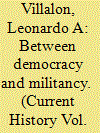

|
|
|
|
|
| Publication |
2012.
|
| Summary/Abstract |
The effort to try to distinguish between good and bad Muslim ideologies may be much less important than the need to support functional political institutions.
|
|
|
|
|
|
|
|
|
|
|
|
|
|
|
|
| 2 |
ID:
105040
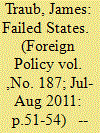

|
|
|
|
|
| Publication |
2011.
|
| Summary/Abstract |
Only some of them. It has been a truism of U.S. foreign policy since the 9/11 terrorist attacks that the United States is, in the words of President George W. Bush's 2002 National Security Strategy, "threatened less by conquering states than we are by failing ones." Defense Secretary Robert Gates has said that over the next 20 years, the gravest threats to America will come from failing states "that cannot meet the basic needs -- much less the aspirations -- of their people." Both as candidate and as president, Barack Obama has repeated this claim and has sought to reorient policy toward the prevention of state failure.
|
|
|
|
|
|
|
|
|
|
|
|
|
|
|
|
| 3 |
ID:
147291
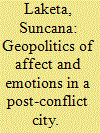

|
|
|
|
|
| Summary/Abstract |
This paper aims to advance our knowledge of the relationships between emotions, affect, and geopolitics. For, among several criticisms of affect’s non-representational theories, is the claim that it has not been used to understand problems of real social and political importance. What is crucially lacking in this important body of work on the nexus between affect and politics is empirically grounded research that examines these processes, especially in situations of geopolitical instability and conflict. In this paper, I seek to address this gap by attending to the geopolitical role of feelings in the volatile political climate of a post-conflict city. Specifically, my work examines the emotional and affective landscapes of daily life in the city of Mostar in Bosnia and Herzegovina which, twenty years after the war officially ended, continues to experience divisions between its Croat/Catholic and Bosniak/Muslim populations.
|
|
|
|
|
|
|
|
|
|
|
|
|
|
|
|
| 4 |
ID:
123678
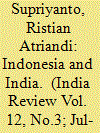

|
|
|
|
|
| Publication |
2013.
|
| Summary/Abstract |
Despite their shared historical and cultural affinities, the bilateral relationship between India and Indonesia is perhaps the least explored, researched, and developed among all the bilateral relations both countries have forged. This is particularly so in the field of defense, despite both countries being Indian Ocean littoral neighbors with only 80 nautical miles between Indonesia's westernmost province of Aceh and India's southernmost Indira Point in the Great Nicobar Island. Both countries have large Muslim populations and share common democratic values. These factors should both be ingredients and incentives to warrant closer defense cooperation. Why then do they seem embroiled in mutual neglect? 1
|
|
|
|
|
|
|
|
|
|
|
|
|
|
|
|
| 5 |
ID:
120441
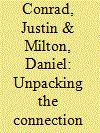

|
|
|
|
|
| Publication |
2013.
|
| Summary/Abstract |
Are countries with large Muslim populations more likely to experience or produce transnational terrorist attacks than countries with fewer Muslims? And if there is a difference, is it attributable to the influence of Islam, or to the economic, social, and political conditions that are common in predominantly Muslim countries? Analyzing all transnational terrorist attacks between 1973 and 2002, this study uses decomposition analysis to identify the relative contributions of the observable and behavioral characteristics of a state on the amount of terrorism that it experiences and produces. The results suggest that Muslim states do not systematically produce more terrorism than non-Muslim states once state repression, human rights abuses, and discrimination against minorities are taken into account.
|
|
|
|
|
|
|
|
|
|
|
|
|
|
|
|